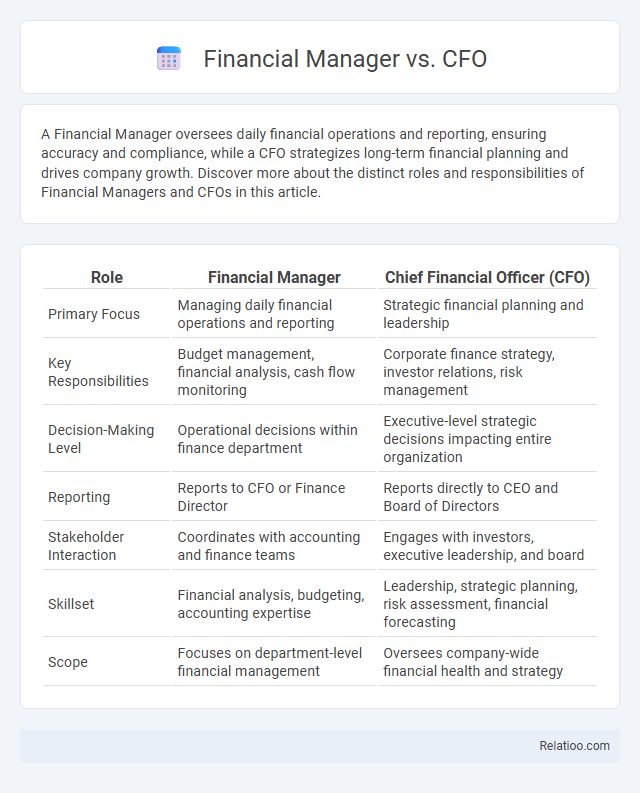A Financial Manager oversees daily financial operations and reporting, ensuring accuracy and compliance, while a CFO strategizes long-term financial planning and drives company growth. Discover more about the distinct roles and responsibilities of Financial Managers and CFOs in this article.
Table of Comparison
| Role | Financial Manager | Chief Financial Officer (CFO) |
|---|---|---|
| Primary Focus | Managing daily financial operations and reporting | Strategic financial planning and leadership |
| Key Responsibilities | Budget management, financial analysis, cash flow monitoring | Corporate finance strategy, investor relations, risk management |
| Decision-Making Level | Operational decisions within finance department | Executive-level strategic decisions impacting entire organization |
| Reporting | Reports to CFO or Finance Director | Reports directly to CEO and Board of Directors |
| Stakeholder Interaction | Coordinates with accounting and finance teams | Engages with investors, executive leadership, and board |
| Skillset | Financial analysis, budgeting, accounting expertise | Leadership, strategic planning, risk assessment, financial forecasting |
| Scope | Focuses on department-level financial management | Oversees company-wide financial health and strategy |
Overview: Financial Manager vs CFO
Financial Managers oversee daily financial operations, including budgeting, reporting, and compliance, ensuring organizational financial health. CFOs hold executive responsibility for strategic financial planning, risk management, and stakeholder communication at the highest level. Both roles require deep financial expertise, but CFOs focus on long-term growth and corporate strategy, while Financial Managers handle operational execution.
Core Responsibilities and Duties
A Financial Manager typically oversees day-to-day financial operations, including budgeting, reporting, and managing financial risks to ensure your company's stability. The Chief Financial Officer (CFO) holds a strategic leadership role, responsible for long-term financial planning, investment decisions, and aligning financial goals with overall business strategy. While both positions focus on financial management, the CFO's duties extend to corporate governance and stakeholder communication, whereas the Financial Manager concentrates on executing financial policies and managing operational finance tasks.
Key Skills and Qualifications
Financial Managers require strong analytical skills, expertise in budgeting, financial reporting, and proficiency with accounting software to oversee daily financial operations. CFOs must demonstrate advanced strategic planning, leadership, risk management, and the ability to drive long-term financial growth, often holding advanced degrees such as an MBA or CPA certification. Your choice between a Financial Manager and a CFO depends on the level of responsibility and strategic focus needed, with Financial Managers focusing on execution and CFOs steering corporate financial strategy.
Educational Background & Certifications
Financial Managers typically hold a bachelor's degree in finance, accounting, or business administration, often complemented by certifications such as CPA (Certified Public Accountant) or CFA (Chartered Financial Analyst) to enhance their expertise in financial reporting and analysis. CFOs usually possess advanced degrees like an MBA or a master's in finance alongside professional certifications including CPA, CFA, or CMA (Certified Management Accountant), reflecting their strategic leadership in corporate finance and risk management. Your career advancement from Financial Manager to CFO often requires not only strong educational credentials and certifications but also demonstrated experience in financial strategy and executive decision-making.
Strategic vs Operational Focus
A Financial Manager primarily handles the operational aspects of financial planning, budgeting, and reporting to ensure day-to-day financial stability. The CFO, by contrast, focuses on strategic financial leadership, shaping corporate strategy, investor relations, and long-term growth initiatives. Your organization benefits when the CFO drives visionary financial decisions while Financial Managers maintain operational efficiency.
Role in Financial Planning & Analysis
The Financial Manager focuses on overseeing budgeting, forecasting, and detailed financial analysis to support operational efficiency. The CFO leads strategic financial planning, driving long-term growth by aligning financial goals with overall business objectives. Your choice between these roles impacts the scope of financial planning and analysis, with the CFO handling high-level strategy and the Financial Manager managing execution and analysis.
Leadership and Decision-Making Authority
The CFO holds the highest leadership role in a company's financial hierarchy, responsible for strategic decision-making, setting financial goals, and guiding overall corporate financial policy. Financial managers oversee daily financial operations, implement CFO directives, and manage teams to ensure accurate financial reporting and regulatory compliance. While financial managers focus on tactical execution, the CFO exercises broader authority in shaping long-term financial strategies and influencing board-level decisions.
Salary and Compensation Comparison
Financial Managers typically earn an average salary ranging from $90,000 to $130,000 annually, while CFOs command higher compensation packages often exceeding $150,000 and reaching well over $300,000 depending on company size and industry. Your total compensation as a CFO usually includes bonuses, stock options, and other incentives, reflecting greater responsibility for strategy and financial oversight compared to Financial Managers who focus more on operational management. Salary disparities highlight the CFO's executive role, with financial managers positioned in mid-level management earning more modest but competitive salaries.
Career Growth and Advancement Paths
Financial Manager roles typically focus on managing day-to-day financial operations and reporting, serving as a foundational position for advancing into higher leadership roles like CFO. CFOs oversee an organization's overall financial strategy, earning significant career growth through executive decision-making responsibilities and board-level influence. Your progression from Financial Manager to CFO involves developing strategic planning skills, gaining cross-functional experience, and demonstrating leadership in financial stewardship.
Choosing the Right Role for Your Organization
Choosing the right financial leadership role depends on your organization's size, complexity, and strategic goals. A Financial Manager typically oversees daily accounting and budgeting functions, ensuring accurate financial reporting and operational efficiency. In contrast, a CFO drives long-term financial strategy, risk management, investor relations, and overall corporate growth, making this role essential for scalable businesses aiming for sustainable success.

Infographic: Financial Manager vs CFO
 relatioo.com
relatioo.com